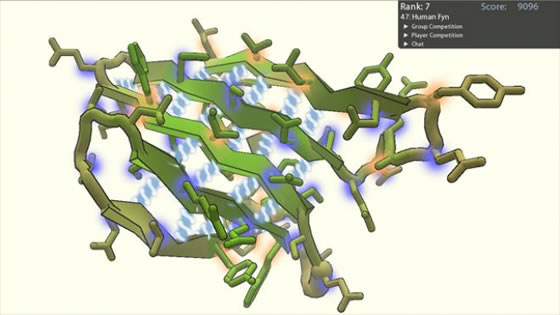
In just three weeks, online gamers deciphered the structure of a retrovirus protein that has stumped scientists for over a decade, and a study out Sunday says their breakthrough opens doors for a new AIDS drug design.
The protein, called a protease, plays a critical role in how some viruses, including HIV, multiply. Intensive research has been underway to find AIDS drugs that can deactivate proteases, but scientists were hampered by their inability to crack the enzyme's structure.
Looking for a solution, researchers at the University of Washington turned to Foldit, a program created by the university a few years ago that transforms problems of science into competitive computer games, and challenged players to use their three-dimensional problem-solving skills to build accurate models of the protein.
With days, the gamers generated models good enough for the researchers to refine into an accurate portrayal of the enzyme's structure. What's more, the scientists identified parts of the molecule that are likely targets for drugs to block the enzyme.
"These features provide opportunities for the design of antiretroviral drugs, including anti-HIV drugs," the authors wrote.
Proteins are made up of long chains of amino acids that fold into complex shapes, but their structures are difficult even for computers to predict.
"We wanted to see if human intuition could succeed where automated methods had failed," said Firas Khatib, a lead author of the study, published in the journal Nature Structural & Molecular Biology.
The researchers were hopeful that their finding would open further possibilities of crowd-sourcing and online game-playing in scientific discovery.
"The ingenuity of game players is a formidable force that, if properly directed, can be used to solve a wide range of scientific problems," Khatib said.
Seth Cooper, a co-creator of Foldit, added, "People have spatial reasoning skills, something computers are not yet good at. Games provide a framework for bringing together the strengths of computers and humans. The results in this week's paper show that gaming, science and computation can be combined to make advances that were not possible before."
 by
by 


Comments
Comment on this Article in our ForumMore GamerzUnite News
Are We Being Controlled in a PC Game by Aliens?
New UFO Film proposes we might!
Explore an Eerie Archipelago in Dredge
A fishing adventure gone bad...
Metasport Arena and Burrst Open the NIL Door for College and High School Gamers
The future looks bright...
Automation Goes Too Far in The Last Worker
A bleak future for anyone looking for a job...
Alien Infestation takes over in From Space
Liberate the Earth in this fun new action-shooter...
The Ascent Cyber Heist DLC takes Cyberpunk Heists to a New Level
New Missions, Side Quests and more...